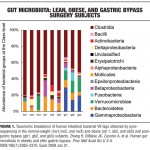 Category: Departments
Category: Departments

Obesity and Cancer: The Meaning of Patient Advocacy
This is a CE-accredited article. The timeline for submitting the post-test for this article has expired. ABSTRACT According to a recent analysis by the American Institute for Cancer Research, about 100,500 new cases of cancer are thought to be caused by obesity every year. This study which is the most comprehensive attempt ever to estimate […]
Dr. Shikora has Left the Building… The Exit Interview of 2009 ASMBS President Scott Shikora, MD, FACS
Bariatric Times. 2009;6(11):14–15. The staff and Editorial Advisory Board of Bariatric Times interviewed Dr. Scott Shikora, exiting president of the American Society for Metabolic and Bariatric Surgery (ASMBS). Here’s what he has to say on his experiences and challenges as the ASMBS 2009 president and his thoughts on the future of bariatric surgery.

Probiotics, Prebiotics, Gut Microbiota, and Obesity
by Margaret Furtado, MS, RD, LDN Bariatric Times. 2009;6(11):27–30. INTRODUCTION Probiotics are nonpathogenic live microorganisms that are believed to confer health benefits to the host when ingested. Researchers have suggested weight loss and/or antiobesity effects are among these benefits. Prebiotics are nondigestible oligosaccharides believed to act as “fertilizers” of colonic microbiota, enhancing growth of beneficial […]
In this “Age of Transparency,” Consulting to Industry Does Not Necessarily Equal Bias
Dear Bariatric Times Editor: Thank you for the opportunity to ask my question on financial transparency to exiting ASMBS President Dr. Scott Shikora in this month’s issue of Bariatric Times (Please see Dr. Shikora’s exit interview). I asked Dr. Shikora the following question: In this age of “transparency,” as we continue to grow exponentially, and […]

Patient Management: Their Journey of Change
by Douglas Sutton, EdD, ARNP, NP-C; Deborah A. Raines, PhD, RN, ANEF; and Natalie Murphy, MSN, FNP-BC Introduction Weight reduction is the most obvious—and often most celebrated—outcome that results following bariatric surgery. As clinicians, we must be reminded that for our patients this physical metamorphosis has been many years in the making. While we often […]







Retrograde Intussusception (RINT): One Group’s Experience and Ideas
Introduction Retrograde intussusception, known in our bariatric office as RINT, is also called reverse intussusception or antiperistaltic intussusception. Retrograde describes the direction the bowel intussuscepts—from distalto proximal (Figure 1). The much more common is operistaltic or antegrade intussusception, where the bowel intussuscepts from proximal to distal, is seen in children and adults. Antegrade intussusception is […]
Continue Reading